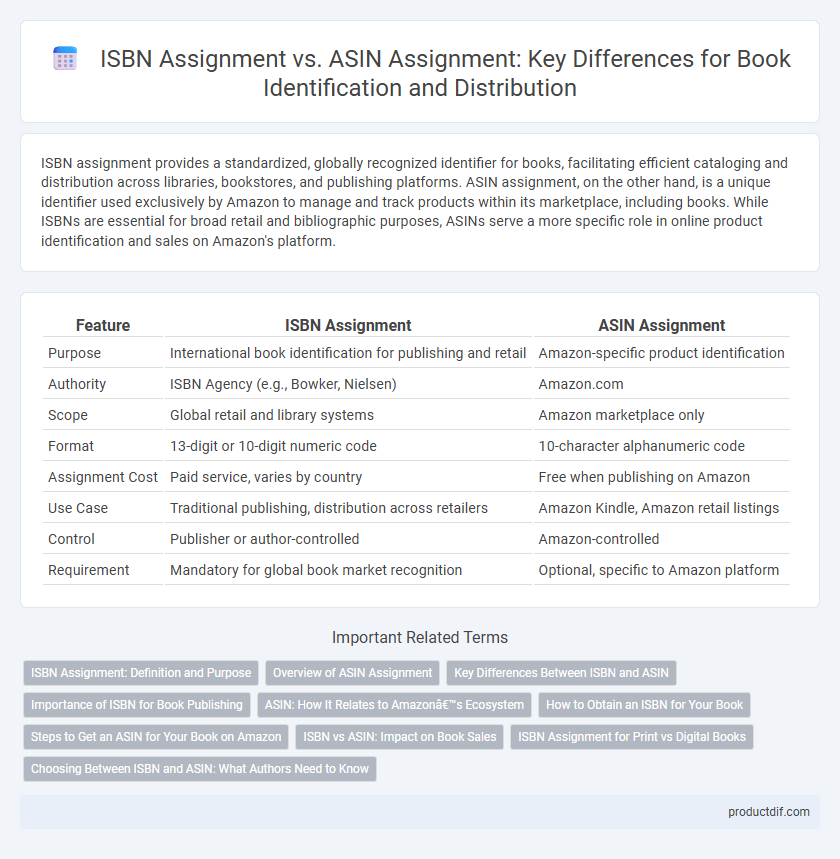ISBN assignment provides a standardized, globally recognized identifier for books, facilitating efficient cataloging and distribution across libraries, bookstores, and publishing platforms. ASIN assignment, on the other hand, is a unique identifier used exclusively by Amazon to manage and track products within its marketplace, including books. While ISBNs are essential for broad retail and bibliographic purposes, ASINs serve a more specific role in online product identification and sales on Amazon's platform.
Table of Comparison
| Feature | ISBN Assignment | ASIN Assignment |
|---|---|---|
| Purpose | International book identification for publishing and retail | Amazon-specific product identification |
| Authority | ISBN Agency (e.g., Bowker, Nielsen) | Amazon.com |
| Scope | Global retail and library systems | Amazon marketplace only |
| Format | 13-digit or 10-digit numeric code | 10-character alphanumeric code |
| Assignment Cost | Paid service, varies by country | Free when publishing on Amazon |
| Use Case | Traditional publishing, distribution across retailers | Amazon Kindle, Amazon retail listings |
| Control | Publisher or author-controlled | Amazon-controlled |
| Requirement | Mandatory for global book market recognition | Optional, specific to Amazon platform |
ISBN Assignment: Definition and Purpose
ISBN assignment is the process of allocating a unique International Standard Book Number to published books, enabling standardized identification and efficient cataloging in global book distribution. This 13-digit identifier facilitates tracking, sales, and inventory management across libraries, bookstores, and online platforms. The ISBN system ensures accurate metadata association, supporting publishers, authors, and retailers in optimizing book visibility and accessibility worldwide.
Overview of ASIN Assignment
ASIN assignment is a unique identifier system used exclusively by Amazon to catalog products, including books, within its marketplace. Unlike ISBNs, which are internationally standardized and assigned by designated agencies, ASINs are generated internally by Amazon for items listed in their store, allowing for efficient inventory management and search optimization. ASINs enable Amazon to track and differentiate products that may share the same ISBN or have no ISBN at all, streamlining online book sales and customer discovery.
Key Differences Between ISBN and ASIN
ISBN (International Standard Book Number) is a unique numeric identifier assigned to books for global book industry standardization, facilitating inventory management and retail sales tracking. ASIN (Amazon Standard Identification Number) is a unique alphanumeric code used exclusively within Amazon's ecosystem to identify products, including books, for online cataloging and search optimization. Key differences include ISBN's universal application across all retailers and distribution channels versus ASIN's limitation to Amazon's platform, with ISBNs being essential for formal book publishing and ASINs primarily supporting Amazon's marketplace operations.
Importance of ISBN for Book Publishing
ISBN assignment is crucial for book publishing as it provides a unique identifier that simplifies distribution, sales tracking, and inventory management globally. Unlike ASIN, which is specific to Amazon's ecosystem, an ISBN ensures your book is recognized and accessible across multiple retailers, libraries, and databases. Publishers rely on ISBNs to establish professional legitimacy, enhance discoverability, and enable efficient metadata management in the publishing industry.
ASIN: How It Relates to Amazon’s Ecosystem
ASIN (Amazon Standard Identification Number) is a unique identifier assigned to products within Amazon's ecosystem, enabling seamless cataloging and searchability on the platform. Unlike ISBN, which is assigned by official book agencies for global identification, ASIN is created by Amazon for internal inventory management and linking to product detail pages. This system allows books without ISBNs, such as self-published or exclusive Amazon titles, to be listed, tracked, and marketed effectively within Amazon's marketplace.
How to Obtain an ISBN for Your Book
Obtaining an ISBN for your book requires applying through an official ISBN agency, such as Bowker in the United States or Nielsen in the UK, providing detailed publication information and paying a fee. The ISBN uniquely identifies your book across global distribution channels, enhancing discoverability and sales tracking. Unlike ASINs, which are assigned exclusively by Amazon for products in their marketplace, an ISBN is essential for traditional publishing and libraries worldwide.
Steps to Get an ASIN for Your Book on Amazon
To get an ASIN for your book on Amazon, first ensure your book is published in Amazon's Kindle Direct Publishing (KDP) platform or listed in their catalog. Amazon automatically assigns an ASIN when you upload your manuscript or add your book details, which uniquely identifies your book within the Amazon ecosystem. Unlike ISBN assignment handled by publishers or ISBN agencies, ASINs are Amazon-specific identifiers and are generated only after your book listing is created.
ISBN vs ASIN: Impact on Book Sales
ISBN assignment enhances book discoverability across global retail and library systems, boosting sales through standardized identification recognized by bookstores and distributors. ASIN assignment is unique to Amazon, facilitating seamless sales within its platform but limiting broader market reach compared to ISBN. Authors and publishers leveraging ISBNs typically access wider sales channels and increase potential revenue beyond Amazon's marketplace.
ISBN Assignment for Print vs Digital Books
ISBN assignment for print books involves assigning a unique International Standard Book Number that identifies the physical edition, format, and publisher, ensuring precise tracking and distribution across retailers and libraries. For digital books, ISBNs distinguish eBook formats and publishers but are sometimes replaced or complemented by ASINs, especially within Amazon's ecosystem. ISBNs remain essential for print editions due to their universal recognition, whereas ASINs are typically proprietary identifiers mainly used for digital products sold on Amazon.
Choosing Between ISBN and ASIN: What Authors Need to Know
Authors must understand that ISBN (International Standard Book Number) is essential for distributing print and ebook formats globally through traditional bookstores and libraries, ensuring wide market access and standardized cataloging. ASIN (Amazon Standard Identification Number) is unique to Amazon and facilitates digital listings and sales within Amazon's ecosystem but does not replace ISBN for broader distribution. Choosing between ISBN and ASIN depends on the author's sales strategy: securing an ISBN is crucial for multi-channel availability and professional recognition, while an ASIN suffices for exclusive Amazon publishing.
ISBN Assignment vs ASIN Assignment Infographic

 productdif.com
productdif.com